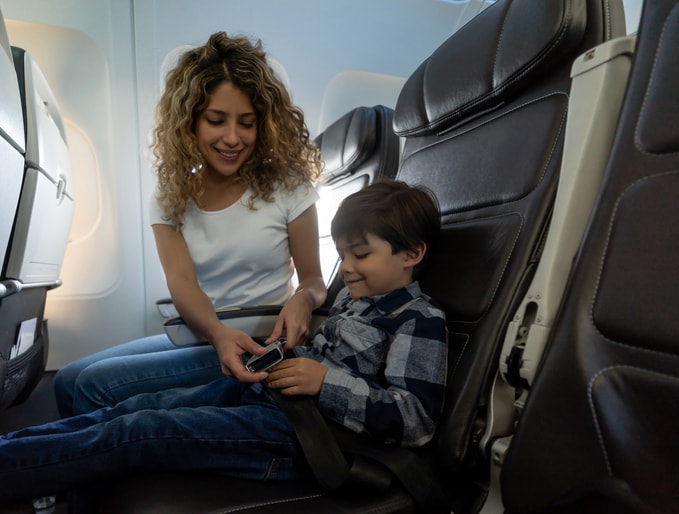The days of booking a flight for your family and wondering if you’ll be able to sit next to your kids may soon be over. After years of chaotic seating arrangements and additional fees, the U.S. Department of Transportation (DoT) just issued new guidelines that direct airlines to seat parents or guardians and their kids under 13 together at no added cost.
So, can parents and kids sit together on planes from now on?
In a statement, the Office of Aviation Consumer Protection (OACP) urges airlines to “do everything in their power to ensure that children who are age 13 or younger are seated next to an accompanying adult with no additional charge.”
The OACP says they receive only a small number of complaints from parents about seating arrangements each year, but “there continue to be complaints of instances where young children, including a child as young as 11 months, are not seated next to an accompanying adult.”
It’s important to note that the new guidance only applies to children under 13. It doesn’t necessarily mean your entire family will be able to sit together. It also doesn’t guarantee an immediate rule change; however, it does put pressure on airlines to make changes quickly. The DoT says it will conduct a review of airline policies and consumer complaints in four months to see if adjustments have been made.
“If airlines’ seating policies and practices are barriers to a child sitting next to an adult family member or other accompanying adult family member, the Department will consider additional action consistent with its authorities,” the statement says.
Why are airlines being asked to stop separating parents and kids?
Parents and caregivers have been fighting to sit with their young kids on planes for years. In 2016, the group Travelers United even helped get a law passed mandating that caregivers be seated with their children on flights. Unfortunately, the group says the law was interpreted in a way that still allows to ignore requests from parents and charge fees to guarantee seating.
In some cases, children as young as 1 year old have been seated separately from their families, according to a 2019 report by USA Today. This includes children with disabilities and urgent medical needs that require supervision from a caregiver.
In response to the newest guidelines from the DoT, many took to social media to say it’s about time.
“It blows my mind that airlines in the U.S. don’t automatically sit parents and kids together,” one person writes. “I’d never come across it before moving here. I constantly complain to the airlines! It should be a right, not something you pay for!”
Educate and Empower Kids, a nonprofit resource for parents and educators, even shared a video that shows the potential dangers of seating young kids away from their parent or caregiver. In it, a young boy seated alone on a plane gawks at an “inappropriate movie” being watched by the stranger next to him.
What can I do to ensure family seating in the meantime?
While the guidance from the DoT may not take effect immediately, there are some things you can do to ensure kids under 13 don’t sit unsupervised on planes. If you’re planning for upcoming travel and trying to book family seating, the DoT recommends:
- Booking flights as far in advance as possible.
- Always booking child and adult passengers on the same reservation.
- Choosing ticket options that allow you to reserve specific seats.
- Learning and using airlines’ lap rider policies for kids under 2.
The DoT also encourages people to submit complaints or comments about their experiences with the family seating using their official online form. These submissions will be taken into account as the organization reviews policies and practices in the coming months.






